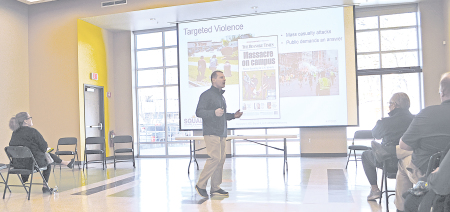Tilting At Windmills: The Case Of The Arsonist In The Embassy
Published:
September 9th, 2022
By:
Shelly Reuben

There were times when an attorney would hire Charles G. King Associates to determine the origin and cause of a fire, but not tell us why we were needed or who would be the ultimate recipient of our report.
This was true for a fire we investigated in a building in Manhattan, where an African Embassy occupied two floors. Since I want to keep things anonymous, other than changing all names, I will refer to this as the S.I.A (Somewhere in Africa) Consulate Fire.
Did our attorney hire us on behalf of the company that insured the building? On behalf of the S.I.A Consulate itself? Or perhaps for the firemen who had rescued the African national? We never knew. And that was just one many weird things associated with this case. Quoting from local newspaper coverage:
“A man the police described as ‘irrational’ set a fire in the S.I.A Consulate yesterday, and was later rescued from the office’s 12th floor window ledge. Identified as Jaay Abimbola, 28 years old, he was taken to the burn unit at the New York Hospital, and later charged with first degree arson. The two firefighters who pulled him from the ledge were injured, and the offices of the consulate were damaged. According to Fire Commissioner Dermot Whelan, Mr. Abimbola was homeless and incoherent. He was attired only in red sweat pants, and his torso was badly burned.”
Charlie and I were brought into the case five months after the incident, and it was something of a miracle that the fire scene was still intact. Prior to our arrival, however, the consulate had been scrutinized – understandably since the arsonist had targeted a foreign embassy – by the New York City Police and Fire Departments, the FDNY fire marshals, the F.B.I., the Office of the District Attorney, the Department of Justice, and...
Wait a second while I catch my breath.
Okay. Lastly, by the Anti-Terrorist Task Force.
Despite the prior presence of so many highly qualified investigative agencies, shortly after our arrival at the fire scene (and much to our surprise), we discovered previously undetected evidence so important that it was hard to understand how everyone else had missed it.
Charlie was examining burn patterns on the double doors between the lobby and the inner offices, and I was poking under some plastic chairs in the lobby when I saw a clump of something that appeared to have been undisturbed since the day of the fire. After photographing it in place, I gingerly removed the bundle from under the chair, started to explore between the folds of singed fabric, and grasped that I wasn’t looking at a pile of burned rags, it was a man’s suit. I shouted, “Charlie!”
He hurried over.
The first thing we took out of the pants pocket was a wallet, the contents of which indicated that it belonged to Jaay Abimbola. As we began to sort through item after item, we realized we had found a treasure trove that would give us insights (perhaps too many) into the mind and motives of the arsonist.
Among the objects we extracted from wallet and pockets were: Abimbola’s Social Security card with a San Francisco address; a California I.D. Card; appointment cards for three hospitals, including a mental health clinic; a lottery ticket; a library call slip; a YMCA baggage check ticket; a book of matches; an employment agency voucher; an employee I.D. card; an expired visa; and most interestingly, a five year diary.
Let me back up a bit before I disclose some of the diary entries, to tell you how Jaay Abimbola came to be in the S.I.A Consulate in the first place. We were told this by the Consulate General himself, a tall, beautifully proportioned man in a perfectly tailored business suit, with impeccable dignity and a face tattooed in fierce vertical and horizontal lines ... which Charlie, I, and the attorney who had hired us, pretended not to notice.
According to this diplomat, Jaay Abimbola has come to the S.I.A. Consulate with no money and no place to stay, stating that he was desperate and pleading to be sent home. Embassy employees said he could spend the night in an area next to the ladies bathroom in the public hall, which had a couch he could sleep on while waiting to go to JFK Airport the following day on a flight (paid for by the embassy) back to Africa. Abimbola was told that he was not allowed to enter or use the inner offices once the embassy was closed.
This falls into the “No good deed goes unpunished” category, because sometime during the night, Abimbola – let’s see. How to describe this in the vernacular? – “Flipped out?” “Went crazy?” “Lost his mind?”
He set two fires in the lobby, broke through double doors to the interior consulate offices, set another fire at the base of those doors, careened along corridors until he arrived at an office overlooking the street, opened a window, climbed out on a ledge, and waited to be rescued by firemen.
According to one newspaper report headlined MIDTOWN FIRE FEARED ARSON:
“The offices of the S.I.A Consulate were heavily damaged and a man rescued from a window ledge was severely burned. The man told fire fighters, ‘God Bless America. I want to die,’ as they plucked him from the building ledge.”
Later in the day, the arresting officer, who was at the burn center to question Jaay Abimbola, wrote in his incident report that, “he kept repeating, ‘I set the fire. I want to die. I want to die’.”
Which brings us back to the diary. In perfect English, Abimbola told a sad story of increasing paranoia, misery, and alienation.
“I mistakenly inhaled a poisonous substance from a can of Strongwood Paint. It caused all sorts of different sicknesses ... I wanted to take the can home for use.”
“The people of New York came to my bed and put some substance in my nose. In the morning, my illness became worse.”
“Harlem Hospital discovered my sickness as schistosoma haematobium. But pretended they didn’t because I am not a Citizen of America.”
“When they knew that I know of the poisoning, they were contemplating taking me for cremation. So I pretended I was going to buy a newspaper, and I ran to the S.I.A consulate for sanctuary.”
“I have been in the consulate without food for three days.”
And so on.
There were additional diary entries about blood in urine and someone putting unknown material “in my nose when I was sleeping” so that Abimbola would become sexually impotent ... which uncomfortably reminded me of statements made by people claiming to have been abducted by aliens from Outer Space.
After his arrest and psychiatric examination (no major revelation), he was said to be “suffering from a psychosis and would need further psychiatric evaluation.”
What happened after that? I don’t know.
Jaay Abimbola had lived in San Francisco for three years. Then in New York. And lastly in the lunacy of his own mind, where he came upon – or brought with him – a container of flammable liquid, and set fire to the offices of the very people who understood his feelings of alienation and were going to send him home.
The New York Police and Fire Department had determined that the fire was arson. Two firemen were injured when they rescued Jaay Abimbola on the ledge outside the building that he had set aflame. The F.B.I., District Attorney, Department of Justice, and Anti-Terrorist Task Force contributed little or nothing to the resolution of the case. And other than finding the cache of documents and diary in Abimbola’s burned possessions, Charlie and I did not make any major discoveries, either.
I took two important lessons away from our investigation, though.
One. That even the most experienced experts from the most highly regarded organizations can miss important evidence (and I can find it).
Two. That crazy people don’t have to wear tin foil hats and talk to Martians to think that the world is out to get them. And when they do, the only thing they need to be very, very dangerous ... is a single match.
Copyright © Shelly Reuben, 2022. Shelly Reuben’s books have been nominated for Edgar, Prometheus, and Falcon awards. For more about her writing, visit www.shellyreuben.com
Author: Shelly Reuben - More From This Author
Comments








